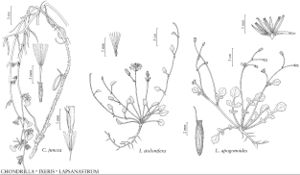Difference between revisions of "Chondrilla juncea"
Sp. Pl. 2: 796. 1753.
FNA>Volume Importer |
FNA>Volume Importer |
||
| Line 34: | Line 34: | ||
-->{{#Taxon: | -->{{#Taxon: | ||
name=Chondrilla juncea | name=Chondrilla juncea | ||
| − | |||
|authority=Linnaeus | |authority=Linnaeus | ||
|rank=species | |rank=species | ||
| Line 50: | Line 49: | ||
|publication year=1753 | |publication year=1753 | ||
|special status= | |special status= | ||
| − | |source xml=https://jpend@bitbucket.org/aafc-mbb/fna-data-curation.git/src/ | + | |source xml=https://jpend@bitbucket.org/aafc-mbb/fna-data-curation.git/src/eaa6e58056e40c9ef614d8f47aea294977a1a5e9/coarse_grained_fna_xml/V19-20-21/V19_334.xml |
|tribe=Asteraceae tribe Cichorieae | |tribe=Asteraceae tribe Cichorieae | ||
|genus=Chondrilla | |genus=Chondrilla | ||
Revision as of 20:18, 16 December 2019
Stems with retrorse, coarse, bristly hairs on basal 10–15 cm, distally glabrous. Leaves: basal withered before flowering, blades 5–13 × 1.5–3 cm. Involucres 9–12 mm. Phyllaries tomentose. Cypselae: bodies 3–4 mm, beaks 5–6 mm, ribs with antrorse tubercles distally; pappi 5–6 mm. 2n = 15.
Phenology: Flowering Jul–Oct.
Habitat: Roadsides, rangelands, grain fields, waste places and other disturbed ground
Elevation: 0–600 m
Distribution

B.C., Ont., Calif., Del., D.C., Ga., Idaho, Ill., Md., Mich., Mont., N.J., Oreg., Pa., Va., Wash., W.Va., Eurasia, Africa, Australia.
Discussion
Chondrilla juncea is native to the Mediterranean region of Europe, North Africa, and Asia Minor. It is a weed in North America (not listed as noxious at the federal level). Its deep and extensive root system competes strongly for soil moisture and nutrients and makes control difficult because it helps the plants survive drought, cultivation, grazing, and most selective herbicides. The large, stiff branches and stems interfere with harvesting. The species is said to be “the most serious weed of Australian wheat-growing regions” (F. D. Panetta and J. Dodd 1987). It also infests millions of acres in California, Idaho, Oregon, and Washington.
Chondrilla juncea is an obligate apomict; its seeds are formed by a parthenogenetic process (E. Battaglia 1949). Nevertheless, the species is highly variable in morphology and biochemical traits.
Selected References
None.
